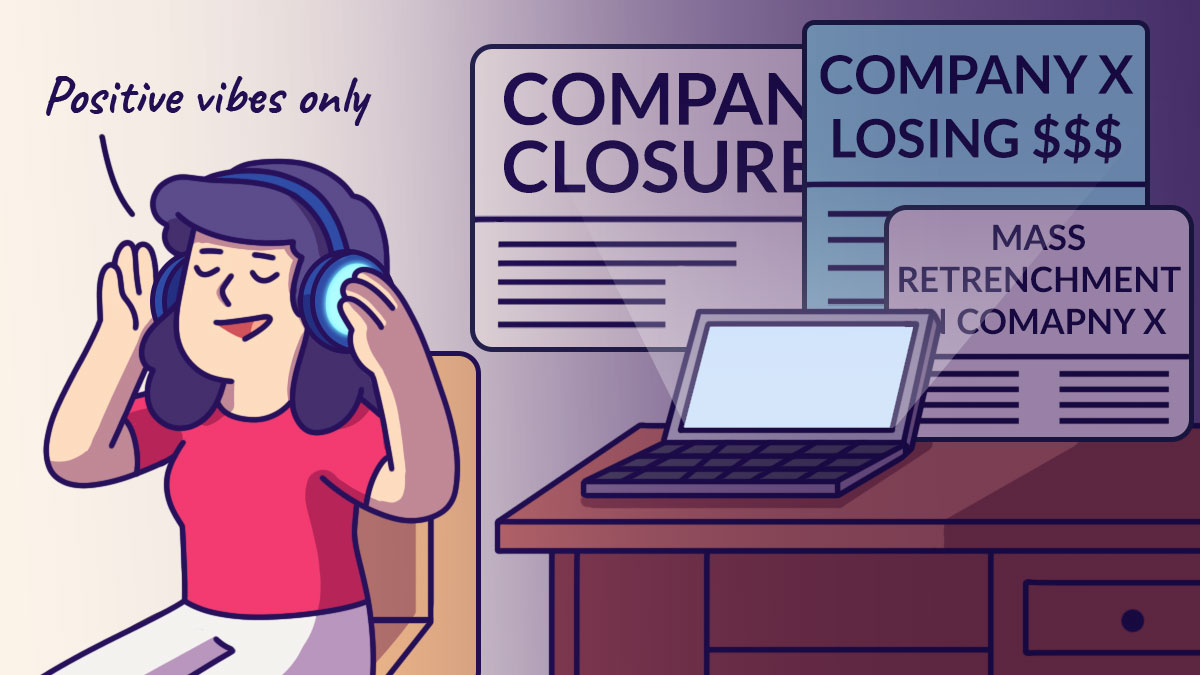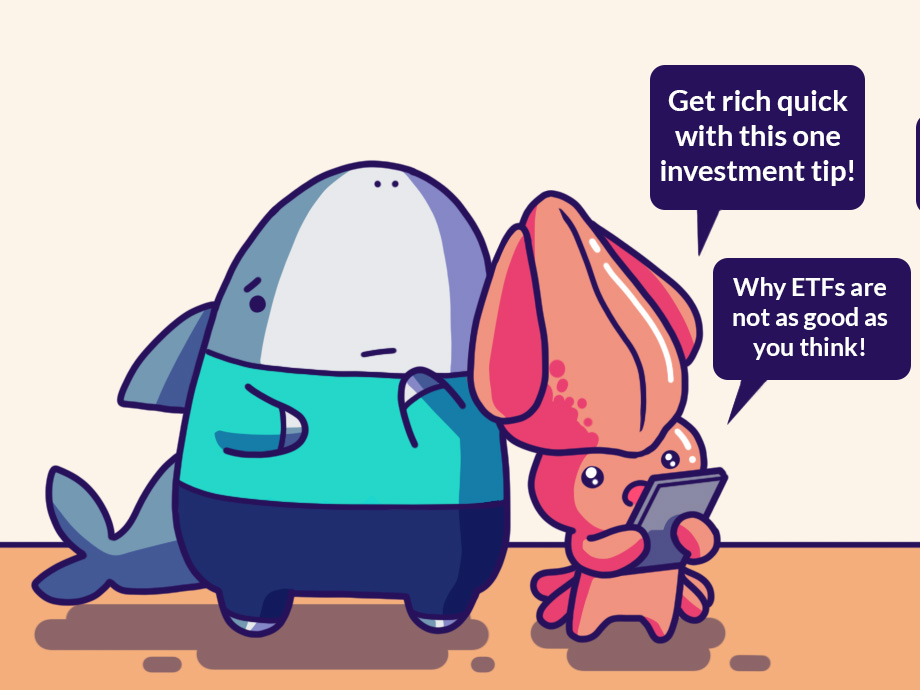Investing | Article
Watch Out For These Red Flags: 5 Ways of Thinking That Are Affecting Your Investment Decisions
by Cherry | 4 Apr 2022

This article is brought to you by ProsperUs by CGS-CIMB
Have you ever wondered why people make their investment and money-related decisions the way they do? Some decisions may seem irrational to one person but make absolute sense to another.
This is because everyone’s choices are often influenced by biases that we have unconsciously developed from our experiences, our environments and even the people that we hang out with.
We might even be unaware that these biases affect our decisions in the first place (until someone points it out to us).
Instead of allowing our instinctive emotions and behaviours to take over and affect our investments, understanding why and how we think the way we do will let us make better decisions for ourselves and our long-term investment goals.
Loss-aversion bias
What is it?
Doing whatever you can to avoid losing money, even when it could come at a great cost.
Nobody likes losing money. But sometimes, we don’t like losing money so much that we make decisions to avoid it even at the expense of potentially obtaining gains.
This is because we feel the pain of a loss more intensely than the joy of earning a proportionally equivalent profit.
How it affects my investments
When the stock market takes a sharp fall, you may sell your stocks immediately to prevent further losses without properly evaluating what exactly is causing the market to dip.
Or you may end up holding on to a stock that continues to fall in price, hoping that the price will bounce back, even though all the news and research show that it’s not likely to happen.
Your brain will rationalise this by telling yourself that selling your stock will lock in your losses, while not selling it means that you avoid making the loss a reality.
These decisions are usually made without you looking into why your investment is dropping in value, because your emotions get the better of you.
Loss aversion is also the reason some people don’t even start investing. In their minds, if they don’t invest, there is no way that they can lose their money, even though the value of their money is going down, thanks to inflation.
How to overcome it
If you know that you’re psychologically wired to feel more pain when you lose, you can minimise making bad decisions based on this pain by having an investing strategy and sticking to it.
For example, you can tell yourself that you won’t sell your investments unless it falls below a certain percentage to prevent selling your investments every time the market drops.
For those who are extremely loss averse, stick to more diversified investments such as exchange-traded funds (ETFs), which tend to have much lower risk than picking individual stocks, and adopt a long-term investing strategy.
Related
Bandwagon or Herd effect
What is it?
Doing something just because everyone else is doing it.
Market bubbles such as the Dot-Com bubble in 2000, and the real estate bubble/Global Financial Crisis of 2008, are often driven by droves of investors that just follow what the masses are doing without thinking.
Investors with a “herd mentality” believe that if many people believe in something, then it must be correct.
In recent years, we have seen this herd mentality leading to the share prices of loss-making companies – such as GameStop and AMC – to rapidly increase in a short space of time.
How does it affect my investments?
Financial psychologists say that this money bias “hurts investors the most” because there is so much buzz and excitement around the investment or stock.
When investors think a big rally is about to begin, everybody crowds into the hot investment. This mad rush often results in investors buying at the peak and when they panic, they sell stocks at the market’s bottom, optimising their investment loss!
How to overcome it
The key to beating this bias is to remember; do not jump just because everyone else is jumping!
Stay focused on the end goal of your investment plan and if you don’t have one, get started today. It may be easier said than done as herd behaviour is often driven by the “fear of missing out”, or what is better known as “FOMO”.
Instead of letting your FOMO get to you, do your own research and make sure the companies you buy into are fundamentally sound investments.

Confirmation bias
What is it?
Only listening and seeking out information that supports what you already believe.
Have you noticed that you tend to listen to the opinions of people you agree with while blocking out those you don’t concur with?
Our confirmation bias makes us more inclined to focus on information that affirms our beliefs.
Meanwhile, any information that may contradict our set views, we tend to ignore, even when that information is factual, relevant, and important.
How does it affect my investments?
Confirmation bias can cause us to make financially-costly mistakes, especially when we refuse to account for factual data that don’t align with our beliefs.
For instance, we may “fall in love” with a particular company because we like its business model or the CEO. This causes us to only seek out only good news about the company and ignore any research or bad news about it.
We may also end up investing too much money into the company and thereby expose ourselves to more risk if the company’s stock declines.
How to overcome it
Shift your mindset to be more receptive to different opinions and ideas, especially when investing.
When looking into a stock or an investment, do your research proactively and consider all the outcomes, risks involved, and seek out information that contradicts your initial beliefs.
Related
Overconfidence effect
What is it?
Thinking that you have all the knowledge you need already and having 100% confidence that you are making the right decisions without the need to consult anyone else.
Overconfidence bias means investors always see themselves as smarter and better than others. That leads them to make rash and poor decisions because they overestimate their abilities and knowledge.
How does it affect my investments?
The overconfident psyche often results in risky bets, as we overestimate our risk tolerance and because we believe that we can beat the market.
Not accepting the investment views and opinions of others often leads to poorly-diversified investment portfolios, which can substantially increase the risk you take on.
How to overcome it
If you’re prone to overconfident behaviour, it can help if you refrain from trading and invest more in longer-term stocks with strong fundamentals.
Being more open to others’ opinions and trying to resist the urge to believe that you know more than others in the market can help reduce your bias.
Familiarity Bias
What is it?
When you only stick to what you know best, even if it may not be the best choice to make.
Do you know anyone who will only shop at a certain place or buy a certain brand of things?
These are examples of everyday life familiarity bias; these individuals will only consider something that they know well.
In investing, people who display familiarity bias only want to invest in assets they know and will not consider options that may be more profitable but which they know less or even nothing about.
How does it affect my investments?
Dissuaded from exploring investment options, familiarity-biased people usually end up with poorly-diversified portfolios and often miss investing in options that could have delivered higher returns.
For example, people often feel more comfortable investing in the stock market in their own country than in other markets. But investors can lose out on potential gains in stock markets overseas that are growing faster.
Markets such as the US, Europe and China have other factors that drive growth, when compared to Singapore. In addition, diversifying into markets outside of Singapore reduces the risk of being exposed to factors that only affect this country.
How to overcome it
It is important to move out of your comfort zone and explore all available investment options.
A broad view of investment products can help create a better-balanced and well-diversified portfolio that better align with your financial goals.
Related
Always have a plan and stay on your toes
While it is easy to get swept away and make decisions that come more naturally to us, having a plan for your investments will help keep you on track.
Set up short-, medium-, and long-term financial plans to have a clear view of how much you should invest and what your expected returns are likely to be over set periods. This exercise is a methodical way to reduce any irrational mental biases that come later.
It is also important that before you invest, set buying and selling price targets. This can guard you against holding on to investments for too long if the price falls or selling as soon as the price rises.
To keep all biases in check, carry out a regular review of your investments. See if your goals are on track and if set targets can be realistically achieved. If the actual market conditions do not favour your plan, make the necessary changes.
Always try to research thoroughly and it will always be helpful to seek insights from professionals who are in the investment field. Take in all the available information, carefully weigh them, and make a balanced decision.
As Warren Buffet once said, “Once you have ordinary intelligence, what you need is the temperament to control the urges that get other people into trouble in investing.” In other words, stay the course.
Related
Content sponsored by ProsperUs by CGS-CIMB
Kickstart your investment journey on the one and only London Stock Exchange (LSE) while reaping exclusive rewards with ProsperUs via its European Market Campaign!
With ProsperUs, you will be entitled to one FREE trade upon completion of your first trade on the LSE! All clients will also stand a chance to earn over S$210 worth of their European experiences of their choice to indulge in English Renaissance Culture! How? Simply execute a specified cumulative number of trades on the LSE within the campaign period. For qualified clients residing in Malaysia, you will also be entitled to rewards of alternative vouchers with similar values. T&Cs apply.
ProsperUs is a digital investment service located in Singapore whose investing ethos is to build long-term sustainable wealth for all. We are committed to bringing investor education to the forefront of everything we do. Let us be a part of your investment journey and gain access to multiple asset classes with just one account—allowing you to invest anywhere around the globe and on the clock. Spearheaded by a passionate team of talented people, ProsperUs provides curated investment insights and financial education to help investors make better informed financial decisions.
This article is being distributed for general information only, and it does not constitute an offer, recommendation or solicitation of an offer to enter into any transaction or adopt any hedging, trading or investment strategy in relation to any securities or other financial instruments. This article is for general evaluation only, and it has not been prepared for any particular person or class of persons and does not constitute and should not be construed as investment advice or an investment recommendation. It has been prepared without regard to the specific investment objectives, financial situation or particular needs of any particular person or class of persons. You should seek advice from a financial adviser on the suitability of an investment for you, taking into account these factors before making a commitment to invest in an investment. In the event that you choose not to seek advice from a licensed or exempt financial adviser, you should carefully consider whether this investment is suitable for you.






















